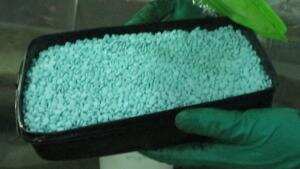Two arrested, 233kg cocaine from Mexico seized
Two people have been arrested and 233 kilograms of cocaine from Mexico has been seized, following a multi-agency operation.
If it reached Australian streets, this amount of cocaine could have had an approximate estimated value up to$104.85 million, and is the equivalent of hits of cocaine that could have affected more than 1.1 million drug users.
The operation began in September 2019, when Australian Border Force (ABF) officersat the Sydney Container Examination Facility targeted a consignment of aluminium alloy ingots that had arrived from Mexico.
The consignment consisted of 18 pallets, each carrying 105 ingots.
ABF officers X-rayed the shipment noting anomalies.
A subsequent examination revealed a white powder secreted within the aluminum ingots, presumptive testing gave a positive indication for Cocaine.
Further examination by Australian Federal Police (AFP) forensics revealed 233 kilograms of cocaine concealed within the shipment.
The concealment of the drugs, inside aluminum ingots, was complex and well-constructed in an attempt to defeat detection by authorities.
A joint agency investigation was commenced, led by the AFP and combining the resources of the ABF and New South Wales Police Force (NSWPF), Australian Criminal Intelligence Commission (ACIC) and the New South Wales Crime Commission (NSWCC),with the assistance ofinternational partners the US Department of Homeland Security Investigations (US HSI).
As a result of extensive investigations, the joint investigationteam identified two suspects who police allege were involved attempting to receive the consignment.
Yesterday (19 November 2019), search warrants were executed at houses and on vehicles in Auburn and Castle Hill. A 61-year-old UK Citizen and a 49-year-old Auburn man were arrested as a result.
During the search at Auburn, police seized a small quantity of aluminum ingots, keys to a storage facility allegedly used to take delivery of the shipment, and electronic devices.
AFP Commander Kirsty Schofield, Manager Organised Crime, said the joint investigation would not have been possible without significant transnational cooperation.
“We are working closer than ever with Mexican authorities, with an AFP liaison officer working in country to ensure we can work at the source to stop the supply offshore,” Commander Schofield said.
“Organised crime networks see Australia as an attractive market to target, due to the high demand for drugs in this country. They don’t care about the lives that are impacted through the violent drug supply chain along the way, or the vicious cycle of addiction they are fueling in our communities.”
ABF Commander Enforcement Command, Graeme Grosse, said the ABF and it’s federal, state and international law enforcement partners were awake to the many creative methods drug smugglers attempted to get their illicit cargo across the Australian border.
“We have the intelligence capability and the technology to find sophisticated concealments like this, no matter how professional they look,” Commander Grosse said.
“Through close working relationships with our law enforcement partners both here and overseas, we continue to achieve significant operational outcomes, smashing illicit drug smuggling syndicates and tackling the growing demand for harmful substances such as cocaine in Australia.”
NSW Police Force State Crime Commander, Acting Assistant Commissioner Stuart Smith, said the National Strategy to fight transnational, serious and organised crime provides a framework for law enforcement to work together to combat activities such as drug trafficking.



